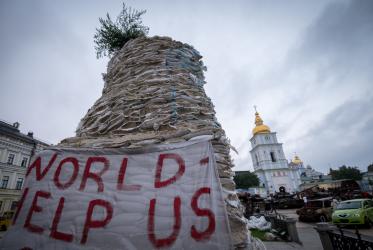WCC Executive Committee, Geneva,18-21 February, 2003
At its last meeting in Geneva, Switzerland (26 August-3 September, 2002) the
WCC Central Committee adopted a statement on South Asia including Sri Lanka.
The statement welcomed the Memorandum of Understanding (MOU) arrived at
between the Government of Sri Lanka and the Liberation Tigers of Tamil Ealam
(LTTE) and urged the ecumenical community to accompany and support the
churches in Sri Lanka in their journey to peace.
The Council has continued to monitor the peace process that has contributed in
a substantial manner towards confidence building and to defuse tension and conflict
in the North. The peace process has gained tremendous enthusiasm and support
of the people who have suffered two decades of hardship, deprivation and
loss as a result of the ongoing ethnic conflict. While much has been achieved
much more needs to be done. An agreement has yet to be reached on issues of
resettlement of internally displaced persons, disarmament and the High Security
Zones. Also remaining on the table to be tackled are sensitive issues like human
rights and recruitment of children for war that LTTE continues to deny.
The journey to peace is only half-way through and much remains to be covered.
Obstacles are bound to come up like the recent aborted attempt by LTTE to smuggle
arms into the country. These have to be taken in their stride and addressed
diligently and firmly. The real test will come when parties begin to outline a constitutional
framework that provides for devolution of power.
The role of the Norwegian Government in facilitating and accompanying the
peace process in a tenacious and sensitive manner needs to be recognized and
appreciated. The international community should now come forward to provide
the much-needed aid and assistance for reconstruction and rehabilitation because
it will go a long way to sustain the peace process. There is an urgent need to revive
the domestic economy so that the people can benefit and take hope from the muchpromised
peace dividend. While Norway and Japan have themselves committed
significant help, other developed nations should follow their example.
The churches in Sri Lanka have provided cautious and critical support to the peace
process, amongst others through inter-religious cooperative endeavours to mobi-
lize people for peace and national reconciliation. They have raised concern about
the situation of the Muslim minority in the Northeast and about the ordinary
people who have not reaped the benefits of the peace process due to lack of relief
and rehabilitation in the affected areas.
The Executive Committee welcomes the developments in Sri Lanka in relation
to the peace process and expresses its appreciation for the consistent cooperative
efforts of the National Council of Churches in Sri Lanka and the Church of Norway,
Council for Ecumenical Relations and International Affairs, to pursue relentlessly
their efforts for peace. It calls on member churches and related agencies to:
remain constant in prayer for the churches and people of Sri Lanka;
support and encourage the churches of Sri Lanka in their continued witness
to peace, justice and national reconciliation;
discuss appropriate ways of providing ecumenical assistance to the churches
in Sri Lanka in their task of reconstruction and rehabilitation.



